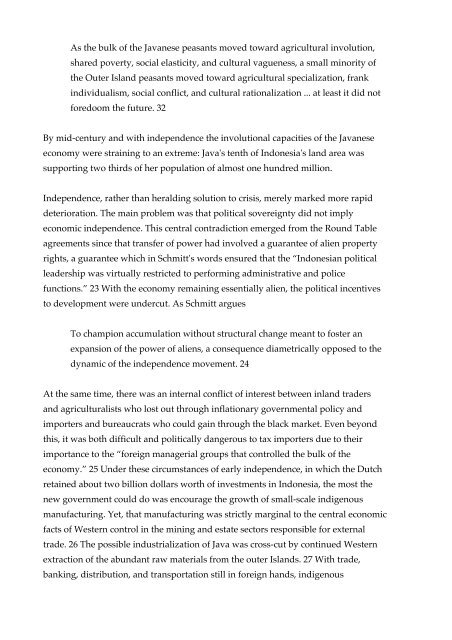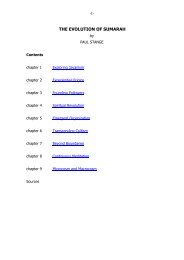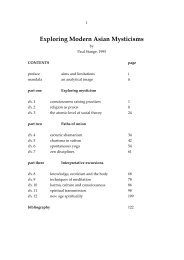Javanese Mystical and Marxist Dialectics - Paul Stange
Javanese Mystical and Marxist Dialectics - Paul Stange
Javanese Mystical and Marxist Dialectics - Paul Stange
You also want an ePaper? Increase the reach of your titles
YUMPU automatically turns print PDFs into web optimized ePapers that Google loves.
As the bulk of the <strong>Javanese</strong> peasants moved toward agricultural involution,shared poverty, social elasticity, <strong>and</strong> cultural vagueness, a small minority ofthe Outer Isl<strong>and</strong> peasants moved toward agricultural specialization, frankindividualism, social conflict, <strong>and</strong> cultural rationalization ... at least it did notforedoom the future. 32By mid-century <strong>and</strong> with independence the involutional capacities of the <strong>Javanese</strong>economy were straining to an extreme: Java's tenth of Indonesia's l<strong>and</strong> area wassupporting two thirds of her population of almost one hundred million.Independence, rather than heralding solution to crisis, merely marked more rapiddeterioration. The main problem was that political sovereignty did not implyeconomic independence. This central contradiction emerged from the Round Tableagreements since that transfer of power had involved a guarantee of alien propertyrights, a guarantee which in Schmitt's words ensured that the “Indonesian politicalleadership was virtually restricted to performing administrative <strong>and</strong> policefunctions.” 23 With the economy remaining essentially alien, the political incentivesto development were undercut. As Schmitt arguesTo champion accumulation without structural change meant to foster anexpansion of the power of aliens, a consequence diametrically opposed to thedynamic of the independence movement. 24At the same time, there was an internal conflict of interest between inl<strong>and</strong> traders<strong>and</strong> agriculturalists who lost out through inflationary governmental policy <strong>and</strong>importers <strong>and</strong> bureaucrats who could gain through the black market. Even beyondthis, it was both difficult <strong>and</strong> politically dangerous to tax importers due to theirimportance to the “foreign managerial groups that controlled the bulk of theeconomy.” 25 Under these circumstances of early independence, in which the Dutchretained about two billion dollars worth of investments in Indonesia, the most thenew government could do was encourage the growth of small-scale indigenousmanufacturing. Yet, that manufacturing was strictly marginal to the central economicfacts of Western control in the mining <strong>and</strong> estate sectors responsible for externaltrade. 26 The possible industrialization of Java was cross-cut by continued Westernextraction of the abundant raw materials from the outer Isl<strong>and</strong>s. 27 With trade,banking, distribution, <strong>and</strong> transportation still in foreign h<strong>and</strong>s, indigenous




